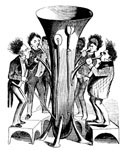
A Catholic Looks at Conspiracy
DO LOOK UNDER THE ROCK
What is a Catholic to make of conspiracy theories? Should we join the ranks of “kooks” and “paranoids” and become conspiracy theorists?
I have no special knowledge of any particular conspiracies. I’ve never been part of an “inner circle” of anything. Still it is relatively easy to reason about conspiracies.
Consider the following list of proposed conspiracies: a Stalinist conspiracy to starve the Ukraine into submission, a Nazi conspiracy to commit a Jewish Holocaust, an international Communist conspiracy, a military-industrial complex that acted as President Eisenhower suggested, a “vast right-wing conspiracy” aimed at “getting” the Clintons, a conspiracy of organized crime syndicates to provide alcohol illegally during Prohibition or to provide illegal drugs today. You would be hard-pressed to find a single person who claims that all these conspiracies were make-believe.
In its Latin origin, the verb “to conspire” means simply “to breathe together.” Any group of people coming together in secret to plan for an objective are conspirators. Given our fallen, sinful nature, it is a fact of life that sinners will conspire together to commit sins. Our legal system makes conspiracy to commit a crime illegal. Common parlance includes many words indicating the existence of conspiracies: organized crime, smuggling rings, accomplices, spies, covert activities, assassination plots, insider trading, collusion, and so on. Intrigues and plots have been the engine of much of history.
Then there is the theory of “unconscious conspiracy.” Although fallen men naturally tend to act in their own self-interest and accumulate and abuse power and wealth when able, it is said that elites pursue their common interests without necessarily being organized or conspiring. But elites gather in the same social settings, attend the same schools, engage in the same recreational activities. The theory of “unconscious conspiracy” assumes that they, having all these things in common, rigorously avoid conspiring, when lesser, non-elite mortals would do so given the same opportunities. Charitable organizations often work together to promote their goals. It is ridiculous to presume that individuals hungry for wealth and power would stubbornly refuse to collaborate. It seems reasonable, therefore, to provisionally accept any conspiracy theory for which there is credible evidence.
You May Also Enjoy
The “something more” that Ahmari's heart craved as a youngster in Iran was fulfilled, it turns out, by transubstantiated wine, water, and unleavened bread.
Secularism could be said to be our national religion, with its own pantheon of "saints," including the newly "canonized" Steve Jobs, founder of Apple and perfecter of the glowing handheld idol.
A Web of His Own Making... Bikkhu Bot... Suicide Droid... Vendor Bender... A Little Dab'll Do Ya... No Clowning... American Haute Cuisine... Burger Madness... To E or Not to E?... Pod People... No Chicken for Falcons Fans... I Wish I Wasn't in Dixie... The Color of Chaos... and more

